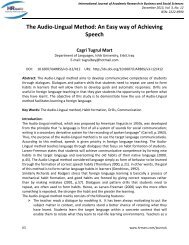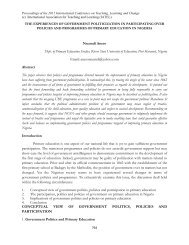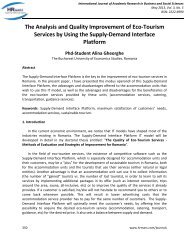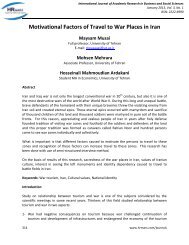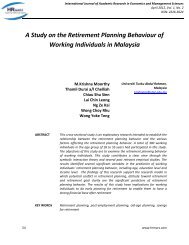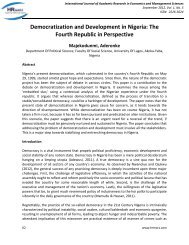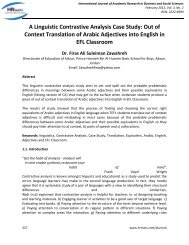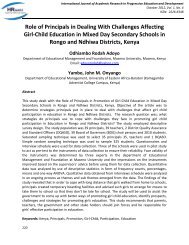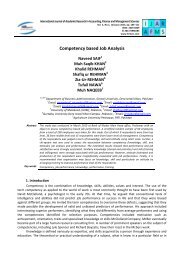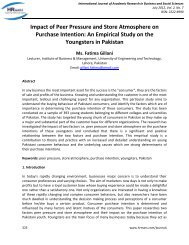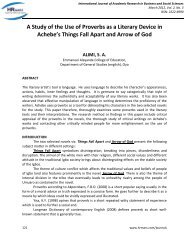Inter Relationship between Emotional Intelligence and Personality ...
Inter Relationship between Emotional Intelligence and Personality ...
Inter Relationship between Emotional Intelligence and Personality ...
Create successful ePaper yourself
Turn your PDF publications into a flip-book with our unique Google optimized e-Paper software.
<strong>Inter</strong>national Journal of Academic Research in Business <strong>and</strong> Social Sciences<br />
May 2012, Vol. 2, No. 5<br />
ISSN: 2222-6990<br />
In comparison with the theory, the current study also produced a similar finding that high<br />
conscientiousness individual does show greater emotional level of intelligence with a score of r<br />
= .552, p< 0.05. Therefore it is to say, the more conscientious an individual is in the school<br />
organization, the more emotional on part of the production positive feeling dimension has<br />
occured.<br />
Conclusion<br />
This study investigated the relationship among the emotional intelligence <strong>and</strong> personality trait<br />
conscientiousness, openness to experiences, extraversion <strong>and</strong> agreeableness. The research<br />
examined the strength of relationship from educator leaders’ perspective. Overall, the result of<br />
this study show that conscientiousness, openness to experiences, extraversion, agreeableness<br />
<strong>and</strong> emotional intelligence are useful in relationship of leadership behaviour.The finding<br />
revealed that conscientiousness emerged as stonger relationship of emotional intelligence<br />
followed by extraversion, openness to experiences, <strong>and</strong> agreeableness.<br />
Underst<strong>and</strong>ing precisely how personality triats <strong>and</strong> emotional relates may have several<br />
implication for human resources practitioner <strong>and</strong> leadership in school setting, particularly in the<br />
area of selection <strong>and</strong> leadership development. Specifically, aspects of personality <strong>and</strong><br />
emotionall intelligence identified as underlying attributes of effective leaders may provide<br />
additional selection for identifying potentially quality educator leaders in schools institution.<br />
Collectively, the results provide support for the relevance of the five-factor model <strong>and</strong><br />
emotional intelligence in leadership school research.<br />
References<br />
Athota, V.S., & O'connor, P.J., & Jackson, C.(2009). The role of emotional intelligence <strong>and</strong><br />
personality in moral reasoning. From http://researchonline.nd.edu.au/sci_chapters/1<br />
Bar-On, R.(1997). The <strong>Emotional</strong> Quotient Inventory (EQ-i): Technical manual. Toronto: Multi<br />
Health Systems.<br />
Bar-On, R. (2000). <strong>Emotional</strong> <strong>and</strong> social intelligence : Insights from the emotional quotient<br />
inventory. In R. Bar-On & J.D.A. Parker (Eds.), The H<strong>and</strong>book of emotional intelligence :<br />
Theory, development, assessment & application at home, school <strong>and</strong> in the work place :<br />
363-388. San Francisco: Jossey-Bass.<br />
Beer, M & Nohria, N. (2000). Cracking the code change. Harvard Business Review, May/June,<br />
pp, 133-141.<br />
Beshart, Muhammad Ali (2010). The relationship <strong>between</strong> emotional intelligence <strong>and</strong><br />
self-efficacy <strong>and</strong> academic success, Education Renovation Journal, 2 910), 1-10.<br />
Burns,J. M. (1978). Leadership. New York : Harper & Row.<br />
234 www.hrmars.com/journals



